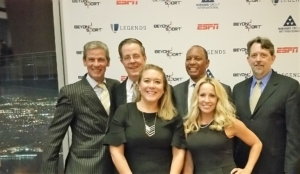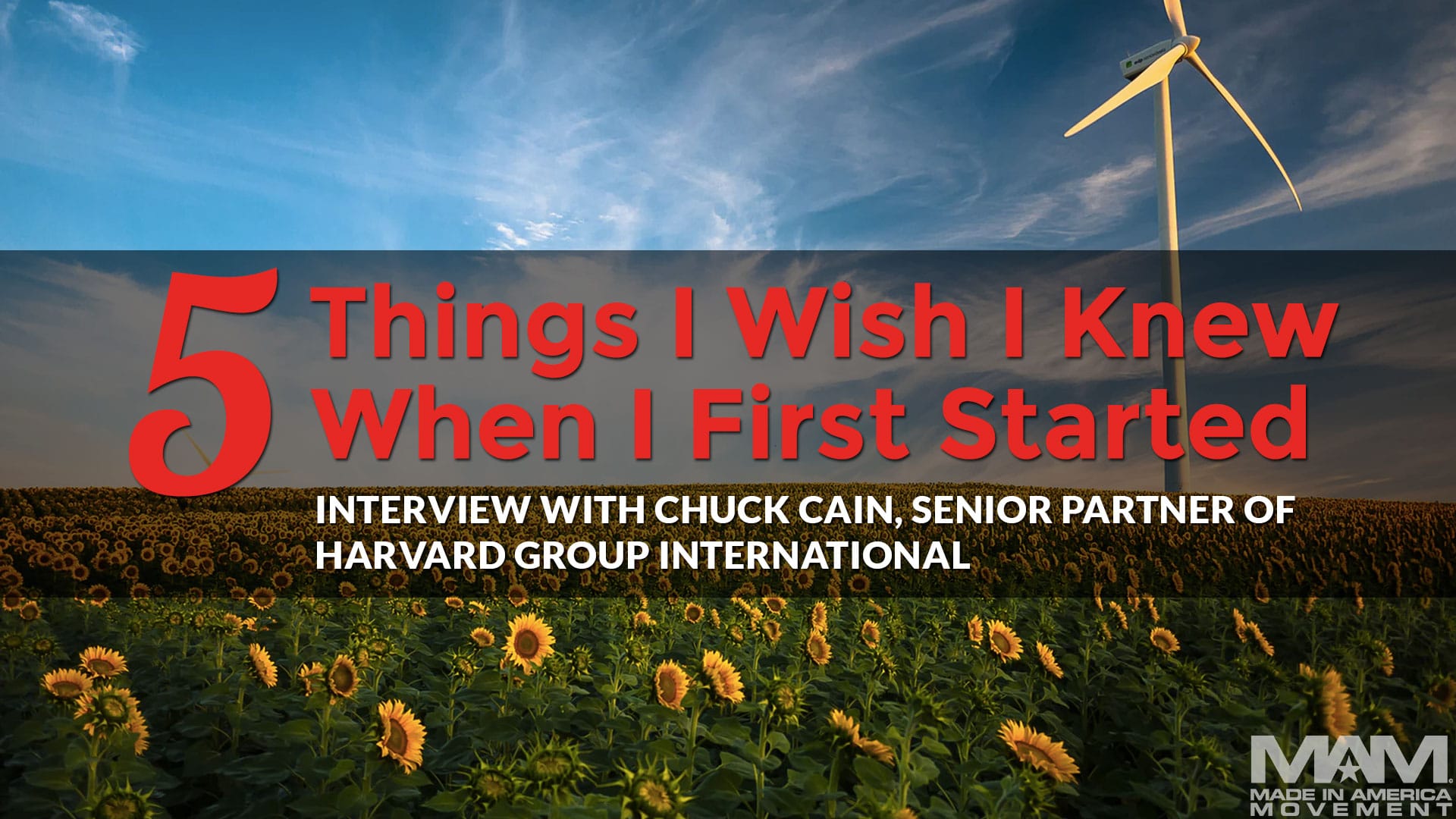5 Things I Wish I Knew When I First Started Out: Chuck Cain, Senior Partner of Harvard Group International
I had the pleasure of sitting down with my friend Chuck Cain of Harvard Group International. Chuck partners with corporate clients to attract senior executive leadership and high-performing professional talent. He is the Leader of the firm’s Consumer & Business Services Practice and Global Sports, Leisure & Entertainment Practice, and serves as a Co-Leader of the Nonprofit Practice. He is also one of the key drivers within Harvard Group’s industry-leading Diversity Practice.
Thank you so much for doing this with us! Can you share a little of your backstory?
 Thanks, Valerie. It is my pleasure and I appreciate the opportunity to talk with you and continue supporting your efforts with the Made in America Movement. My backstory and path are certainly nonlinear. Going way back, I grew up in Harrisburg, PA and attended Susquehanna Township HS, with was a very small district nestled between the city school district and a massive suburban district. I like to say we were sort of like Luxembourg or Liechtenstein. But, it was amazing, as it was probably the most diverse setting one could imagine between race, religion and socio-economic demographics. After high school, I had a bit of arrogance in approaching my college choices…not only searching out the best schools but the hardest programs at each school.
Thanks, Valerie. It is my pleasure and I appreciate the opportunity to talk with you and continue supporting your efforts with the Made in America Movement. My backstory and path are certainly nonlinear. Going way back, I grew up in Harrisburg, PA and attended Susquehanna Township HS, with was a very small district nestled between the city school district and a massive suburban district. I like to say we were sort of like Luxembourg or Liechtenstein. But, it was amazing, as it was probably the most diverse setting one could imagine between race, religion and socio-economic demographics. After high school, I had a bit of arrogance in approaching my college choices…not only searching out the best schools but the hardest programs at each school.
That arrogance served me well in getting into a great program at the University of Pennsylvania called the Jerome Fisher Program in Management & Technology. This is a dual-degree program with the Wharton School of Business and Penn’s School of Engineering & Applied Science. That arrogance also got my butt kicked hard and heavy during my Freshman year, teaching me that I had no earthly idea how to study. I was a hard worker, but not a smart worker. What a great lesson (that I am trying to teach my kids at a much younger age)! I recovered from that first semester and completed my degrees, only to walk into one of the toughest job markets in the US at the time in the early 1990’s…teaching me about failure and perseverance in a different way. Instead of landing a great job in management consulting or in a corporate training program, I joined a large printing company selling paper that looks like wood to furniture manufactures.
After several years there and excelling in sales (a field I never envisioned as a 22-year old introvert), I pursued my MBA at the Stern School of Business at New York University. Armed with motivation and understanding of how to study, my performance was much better. Ha! After NYU and having worked for a 35,000-person company before, I pursued a more entrepreneurial path, joining a start-up consulting firm in NYC (which went the way of many start-ups and had me looking for a new path in six months). I actually joined up with my father’s business for a short time in a consulting role in Washington DC before finding my way to a small business consulting firm teaching “Management 101” to small business owners, mostly those in the trades like roofing, mechanics, etc. With my background in printing, I was approached by a former NYU classmate who was trying to help a digital printing company find a new head of marketing and sales. Knowing my background, he thought I would know someone for the role. Turns out it was me, and I headed back to NYC to help rebuild this company and had a blast for a number of years working to reinvent a company founded on a dying technology.
Then life stepped in and I ran into an old friend at our college reunion. I was in NYC, she was in Atlanta. Yet it worked and the next thing you know this Northeastern stalwart was moving to Atlanta. I took a job as COO of a small home healthcare company for a short time, realizing that healthcare wasn’t my passion. This is probably a theme in my career…quickly seeing that I wasn’t passionate about my job and moving on to something else. Maybe not the smartest thing for the career, but it is how I am wired. After exploring a great many options, including starting my own company, I came upon Harvard Group International and was drawn to the work of an executive recruiter and the amazing entrepreneurial nature of the firm. And, almost 14 years later, here I am still at Harvard Group and still married to that old friend.
This obviously is not easy work. What motivates you?
That is a tough question. I think one of my primary drivers throughout my life is fear of disappointing people. In this business, that seems to serve me incredibly well. The key people in that equation are my wife and two kids. But it also extends significantly to my coworkers, my clients and my candidates. We are selling an amazing service and we are really good at it. But, our service dramatically affects the lives of everyone involved! Our clients are not just companies, but really the people dependent on the company for a livelihood. Our candidates are often not just a candidate, but a family who we are asking to make a significant career change and possibly a relocation. These are heavy decision on both sides of the equation and I take pride in our ability to find incredible matches to our clients; needs and to our candidates’ goals.
Another key driver for me is that passion I mentioned before. It seems after a long and winding search of things that I really didn’t have a passion to do, I have found something that I love, am good at and provides an amazing contribution to the lives of people. You and I have talked a lot over the years about making an impact on people and society through our lives and our work. The ability to do that through a vehicle that challenges me, keeps me learning, and provides for my family is a wonderful gift to have found.
None of us are able to find success without some significant help along the way. Is there a particular person you are grateful for that helped you get to where you are?
Honestly, I can’t name a particular person because I have been blessed by so many great family, friends and coworkers that have helped shape me (and frankly some unbelievably bad examples that I have learned from as well). Overall, the lesson that you can be successful by being a good person has become the central theme that has gotten me where I am. Mind you, just being a good person doesn’t equal success. It takes talent and drive and the ability to deal with failure. But, for me, having a foundation of treating people well, regardless of who they are or where they come from and help me find where I need to be in my career.
 What are your “5 things I wish I knew when I was just starting out” and why? (Pick which question you prefer. Please share a story or example for each, if item possible. Readers like examples.)
What are your “5 things I wish I knew when I was just starting out” and why? (Pick which question you prefer. Please share a story or example for each, if item possible. Readers like examples.)
1. Do something you are passionate about. Yes, the theme continues. When I was in college, everyone’s goal was the best job on Wall Street, a major consulting company or a big corporation. But, as I’ve seen my friends progress in their careers over the years, very few of them found a passion early on. There are certainly a lucky few that did, and I am so happy for them. My path took a while, as I was really good at realizing what I didn’t want to do. This started out working in high school for my dad’s freight company teaching me that I did not want drive trucks or work on the docks…great work and hard work, but most definitely not my work. My examples continued with roles I didn’t like or companies that weren’t a fit, until I left the home healthcare company. After a couple of pretty miserable years professionally (that were thankfully balanced by amazing personal years as I got engaged and married), my wife told me to find something that I really wanted to do. She said “Don’t find a job. You’ve had those and they aren’t working out too well.” And, as I said earlier, almost 14 years later, here I am at Harvard Group International loving what I do and where I do it (and, yes, thankfully, still married to that incredibly smart woman set me on the path to this journey.
2. Be a provider of solutions. I never thought I’d be a salesperson growing up. It wasn’t in my nature, until it was. What I found when I was thrown into a sales job is that I absolutely WAS NOT a “salesman” as stereotyped. I can’t sell ice to Eskimos or flood insurance in a desert. But, I can be an amazing provider of solutions, even if it isn’t the solution that I sell. It is unbelievable how many relationships I have built (and how much business I have built) by initially turning people away from the product or service I was selling if it wasn’t right for them. One example comes from my days selling digital printers. There weren’t $99 inkjet printers on your desk. These were $200,000 printing systems that required another $100,000 in infrastructure setup for the print shops. I made immense effort to fully understand their businesses to know if my solution was right for them. First, I didn’t want to bankrupt a good person. Second, we made our money selling inks. We can’t sell inks if the company closes. So, I often had someone that was intent on buying our equipment but their business wasn’t ready for it. So, I introduced to them competitors that had the right printer for them. If that printer worked well for them, I’d tell them to buy a 2nd one. If they filled the capacity on the 2nd one, then I’d tell them to buy mine (and I’d take those other two off their hands) …because NOW they were ready for our printer and had the business to support the payments. And, NOW we were going to be selling them a lot of ink. Everyone wins…even my competitors who sold printers and a lot of their inks.
This advice applies to any job and to life. When a challenge arises, provide solutions! As I’ve heard many leaders say over the years, “Don’t bring be a problem. Bring me potential answers to the problem.” Apply this to your work and your personal life and good things happen for everyone.
3. Be a networker that builds relationships and creates value. Everyone these days talks about networking. I wish they talked about it when I was starting out. Again, we were still in the world of “go to a good college and get a good job and things will work out”. We all made friends in school and work. We all got to know people. Frankly we all “networked” …but the key is not having the network. The key is having great relationships with the people in your network and creating value for them.
[clickToTweet tweet=”‘The key is having great relationships with the people in your network and creating value for them.’ – @Chuck_Cain @USA_Movement” quote=”‘The key is having great relationships with the people in your network and creating value for them.'”]
That could be as simple as coaching a youth sports team for a season to impact the life of a kid and maybe their family. I can’t tell you how good it feels when a parent reaches out to ask if I am coaching again next year and how can they get their child on my team. Mind you, I am not a good coach! But, I strive to provide value to that child in the sport and in character building. My daughter jokes with me that even when I am not coaching, I am helping on field at practice and sometimes know the kids better than the coaches do.
This one really does mesh with #2 as well. In your work, build relationships, solve problems and create value. In my work, everyone uses the team “headhunter” (I prefer “bodysnatcher”). But, when people ask me what I do for a living, I tell them that I network. It drives my wife crazy sometimes, but my job is not to network…I am a networker. She tells the kids I know everybody. I don’t, but I wouldn’t mind if I did. I do pretty much talk to anyone (how is that for someone who was an introvert growing up) and I probably try to learn too much about them. But, I want to know what they need so I can create value. The really cool thing about that is that I have found a role where this foundation in networking and creating value for others also creates value for me, my company and my family. Home run!!
4. Trust your instincts in work and life. Now, you may not have great instincts for work at a young age, but I wish someone had told me early on to trust myself when I had a strong feeling on something. Probably the biggest example of this for me was when I was interviewing for my current job. I was talking to a lot of search firms and other companies. I had some good opportunities developing, but the one that felt right was Harvard Group International. But, to lay the foundation to you, our firm was 100% commission at the time. So, imagine that discussion when my wife asked about the salary. But, it really felt like the right opportunity and the right place to do it to me, so I trusted my instincts…and followed my wife’s advice to find something I really wanted to do. It was a good call.
5. Take a breath. I’m still working on this to be honest. The people in my life growing up worked hard and a lot. So, I think that is what I was used to seeing. In a job that and new world when you are always connected, it is hard to take a breath. But, like we need sleep to recharge our bodies, we need to have downtime to recharge our minds. I often find that our days are moving at 80mph from early morning until bedtime with getting ready for work/school, going to work, picking up kids and the evening routine (dinner, homework, practice, trying to have some family time and get to bed) …then same thing next day. Our weekends are more and more scheduled. I think if I had learned earlier in my career to take a breath, I’d be better at it now. I am getting there and I recommend that others do it.
The Made in America Movement represents 20,000 American based companies that build their business in the USA. Why do you personally care about the Made in America Movement?
I guess the obvious answer is that I am an American and want my country and our people to be successful. But, and I hope this doesn’t come across as an arrogant American, I think the world and global community are better off with a strong America. Growing up in a multicultural school, living in many great multicultural cities (New York City, Washington DC, Atlanta) and having a wonderful multicultural family, I love what our country offers to its people. Yes, we have many challenges and we seem more divided than ever recently. But, the protests and opinions and system drive change and compromise. They also help us hear others and strive to make things better. Being able to continue to grow as a country demands both a strong economy and a national pride. The work that the Made in America Movement is doing is a vital program that will help solidify both!
What’s the best advice you’ve ever received?
Work to live. Don’t live to work. Hearing this always drives home the understanding about why we work. We work to create a lifestyle we want to live and that allows us to make an impact. If we lose the focus on WHY we work, we ultimately will miss on life.
Note to our readers: If you enjoyed this interview, please click on one of the share buttons to post to your linkedin, twitter, facebook or pinterest.




